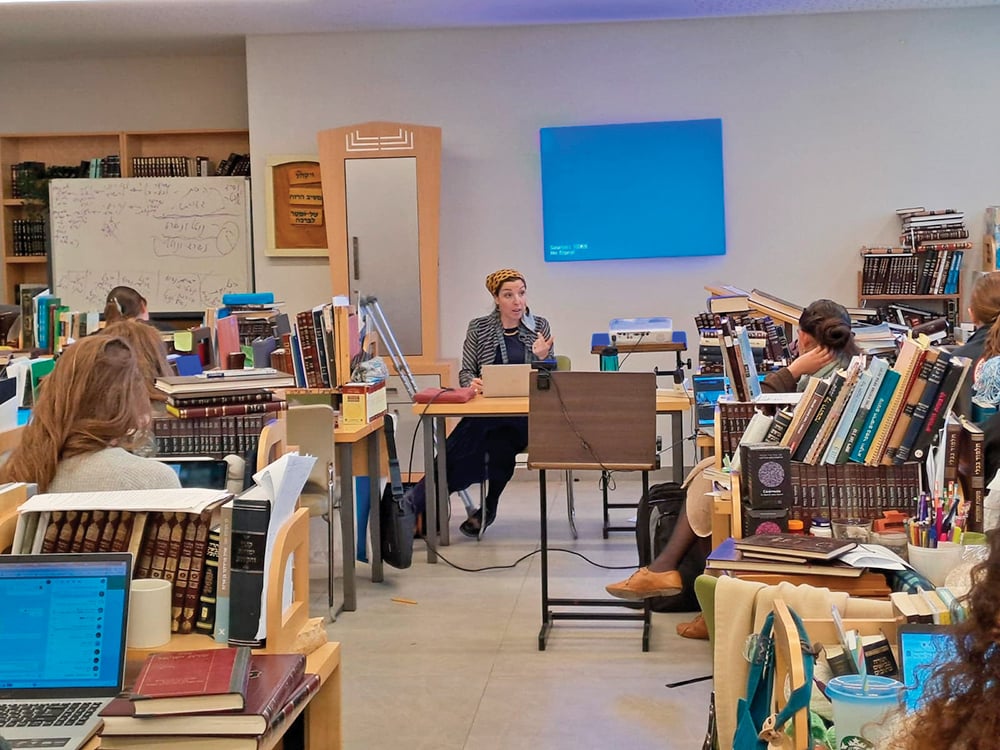
Highland Park native Shana Strauch Schick has an impressive CV that boasts dozens of scholarly articles she has published on Talmudic research and rabbinic literature, and positions she has held in both academic institutions and beit midrash programs.
Schick’s love for Talmud that burgeoned during her teenage years was born out of her passion for the Jewish faith. But as a religiously devout young woman, she had a difficult time in high school reconciling why she was not learning texts that the Jewish religion so values. Her all-girls high school in Northern New Jersey did not offer Talmud classes as part of its curriculum. So Schick would spend her summers poring over pages of Gamara. After graduating college, she spent five years studying Talmud at Stern College’s Graduate Program in Advanced Talmudic Studies, and received bachelor’s and master’s degrees and a PhD in Talmud from Yeshiva University. She studied alongside two brilliant educators and scholars of Talmud, Rav Moshe Kahn and Yaakov Elman.
In 2011, Schick made aliyah from Highland Park, bringing her Talmudic scholarship to Israel, where she is advancing her research and educating hundreds of students. She teaches at The Multidisciplinary Department of Jewish Studies at the International School of Bar Ilan University and the Talmud department there, as well as at the Drisha Institute. She relishes in the opportunity she has to work in both academia and in the beit midrash setting.
Her first book, “Intention in Talmudic Law,” was published in 2021 and explores the role of “intentional behavior” or intent in cases of religious, criminal and civil law throughout the different generations of the sages of the Talmud. In her research, she examines texts of other religious groups—particularly sources of the Zoroastrian faith that was the official religion of Persia, under which the sages of the Babylonian Talmud lived—that were written during the same period the Talmud was developed. Significant parallels between the Talmudic texts and Zoroastrian sources shed light on how Zoroastrian influences might have shaped rabbinic legal thinking.
Schick’s method of research is what she calls “a source critical approach,” whereby she isolates the text at hand from later additions and edits to the Talmud in order to identify the original meaning of the particular statement.
For Schick, studying Talmud is all about connecting to the past heritage of the Jewish nation. “These are texts that people were studying 1,000 years ago,” she explained. “It is this running thread throughout our history that has sustained us and guided us.”
Schick is currently working on her second book, which will focus on discrepancies in women’s obligation in the commandments as seen through different rulings in the Babylonian and Palestinian Talmud. Here too she looks at sources of other neighboring groups when the Talmud was developed, in this case the Romans who were the ruling power in the Land of Israel. By examining the laws of Roman rule during the time the Palestinian Talmud was developed, she is able to understand how Jewish law that was developed in the Land of Israel might have been shaped by the local imperial law of the Roman empire.
Though the Talmud developed over 1,500 years ago, Schick finds its teachings and lessons relevant even today. She gives the example of the tremendous internal feuds during the time of the Second Temple period, which was followed by the development of the Mishna. She explains that the very project of the Mishna is a text that brings multiple opinions, including those the sages did not agree with. She continues to explain that even though the Mishna held according to the House of Hillel, it cited the House of Shammai in order to bring opposing views, which could be seen as a way of correcting the hate and disagreement that characterized the nation when the Second Temple was destroyed. “We can have different opinions and we can respect them, and that is the way to build a better Jewish society, and that’s what lets us persist,” Schick said, alluding to the challenges in Israeli society today.
Schick credits her parents, Dr. Joseph and Cheryl Strauch, who have been anchors of the Highland Park Orthodox community for over 40 years at Congregation Ohr Torah, for giving her the encouragement to pursue a life of Talmud study. And she counts her blessings every day that she is able to pursue her passion in Israel.
Alisa Bodner is a Fair Lawn native who immigrated to Israel over a decade ago. She is a nonprofit management professional who enjoys writing in her free time.









